
$64,000 Question (2000)
ABC Carnival '74
Across the Board
Baloney
Bamboozle
Be What You Want
Beat The Genius
Beat The Odds (1962)
Beat The Odds (1975)
Bedtime Stories
Big Spenders
Blank Check
Body Language
Body Talk
Bullseye
Call My Bluff
Card Sharks (1996)
Casino
Caught in the Act
Celebrity Billiards
Celebrity Doubletalk
Celebrity Secrets
Celebrity Sweepstakes
Chain Letter (1964)
The Challengers (1974)
Change Partners
Child's Play
Combination Lock (1996)
Comedy Club
Concentration (1985)
The Confidence Game
Cop Out
Countdown (1974)
Countdown (1990)
Crossword
Decisions, Decisions
Dollar a Second
Duel in the Daytime
Fast Friends
$50,000 a Minute
Finish Line (1975)
Finish Line (1990)
Get Rich Quick
Going, Going, Gone!
Head of the Class
High Rollers
Hollywood Squares (1965)
Hollywood Squares (1985)
Hot Numbers
Hot Potato
House to House
How Do You Like Your Eggs?
Jackpot (1984)
Jeopardy (1977)
Jokers Wild
Jumble
Key Witness
Keynotes (1986)
King of the Hill
Let's Make a Deal (1963)
Let's Make a Deal (1990)
M'ama Non M'ama
Match Game (1962)
Match Game (1973)
Match Game (1990)
Match Game (1996)
MatchGame (2008)
Mindreaders
Missing Links
Monday Night QB
Money in the Blank
Money Words
Moneymaze
Monopoly (1987)
Nothing But the Truth
Now You See It (1986)
Oddball
100%
PDQ
Party Line
People On TV
Play For Keeps
Play Your Hunch
Pot O' Gold
Pressure Point
Pyramid (1996)
Pyramid (1997)
A Question of Scruples
Quick as a Flash
Razzle Dazzle
Riddlers
Run For The Money
Says Who?
Scrabble (1990)
Second Guessers
Second Honeymoon
Sharaize
Shoot for the Stars
Shoot the Works
Shopping Spree
Show Me
Showoffs
Simon Says
Smart Alecks
Smart Money
Spellbinders
Spin-Off
Split Decision
Star Cluster
Star Play
Strictly Confidential
TKO
Talking Pictures (1968)
Talking Pictures (1976)
Tell It to Groucho
Temptation (1981)
$10,000 Sweep
The Better Sex
The Big Money
The Big Payoff
The Buck Stops Here
The Choice Is Yours
The Couples Race
The Fashion Show
The Honeymoon Game
The Love Experts
The Plot Thickens
The Price Is Right (1972)
The Waiting Game
Three of a Kind
Tic Tac Dough
Tie-Up
Top Secret
Twenty One (1982)
Twenty Questions
Twisters
Up and Over
We've Got Your Number
What Do You Want?
What's On Your Mind
Wheel of Fortune
Whew!
Whodunit
Whose Baby
Wipeout
Word Grabbers
Write Your Own Ticket
You Bet Your Life (1988)
You Bet Your Life (1991)
You're Putting Me On
Show a Random Pilot
Show Unreviewed Pilots
Bob Stewart Flow Chart
The Honeymoon Game
Producer: Jack Barry for Metromedia
Host: Jim McKrell
Announcer: Gary West
Celebrities: Bob Crane, Jaye P. Morgan, Marc Copage, Don Drysdale, Edmund G. "Pat" Brown
Taping Info: October 3, 1970, KTLA
Made it to Air: The pilot aired as a syndicated show in the summer of 1971.
Availability: The entire pilot is at UCLA. The last hour is on the trading circuit. This will make more sense as you read.
In the early 1970s the syndication world had finally begin to take off mostly due to the Fin-Syn rules, which disallowed networks from being in the creation of syndication product. Jack Barry, freshly energized and rejoining the game show biz, decided it was time for a 90 minute game show. This extravaganza, originally called The Love Game, was renamed The Honeymoon Game and was taped in late 1970. Recently off his stint on The Game Game, Jim McKrell was brought in to helm the shindig.
In the copy of this that is circulating in the trading circuit, Jack Barry appears in the beginning, giving a brief recap of his résumé and begins to say that of everything he is done, he is most proud of The Honeymoon Game. So proud, in fact, that he wants this show to be superb. And he felt the first part of this game wasn't superb, so when this show goes to air, the first part won't air, instead, the second and third parts will be longer plus there will be longer contestant interviews. And after seeing the first part, I could see why Jack didn't like the first game.
The first game featured six newly-married couples. Three of those couples came on stage and essentially played a bizarre combination of personal identification and ESP. The husband would have to answer a very broad question (e.g.: What is his favorite hobby?) that eventually became slightly more focused (e.g.: What night would you see him?) If by some chance the husband correctly was able to answer correctly, the wife would then try to answer the common person based on the questions played so far. The male rarely answered correctly, and when they did, the female tended not to answer correctly. After a painful 10 or so minutes, the two couples with the highest score would move onto the semifinals. Then the three other couples came out and did the same thing, this time with the women answering the generic questions and the men trying to guess the common person. This was much worse than it sounds.
Moving onto round two, Jack Barry took a page out of the Bob Stewart book and recycled a prior failed pilot — The Joker's Wild. At this point, it is still a celebrity-based version, with Bob Crane asking showbiz questions, Jaye P. Morgan asking about music, former California governor Edmund G. Brown tests your political skill, terrible kid actor Marc Copage (from Julia) wants to know about your kid stuff while Don Drysdale makes a repeat appearance from The Joker's Wild. After pulling the question lever, three boxes came up that would either represent the categories or a 'bonus'. Couples received one point per bonus, while getting the chance to get more points by answering a question correctly, which would be worth either one point (if the category appeared in only box), two points (if the category appeared in two) or three. Couples alternated turns and played until one couple received 11 points.
However, way too many points in this round were earned by the bonus route, since the couples proved to be unusually dense. Additionally, Bob Crane was given awful puns to read before his question, Jaye P. Morgan mostly hummed her questions, Pat Brown was quite the politician by not strangling contestants when players would miss easy questions about him or government in general, while Marc Copage gave an early indication on why cuteness does not equal acting ability. The two couples who won their games then moved onto the finals.
The finals continued to use The Joker's Wild motif, but the celebrities are now gone. The left wheel would indicate the category, the right wheel would indicate a dollar amount from $10 to $100, while the middle wheel only came into play if the question was answered correctly. If the couple answered the question correctly, they could then decided to "take-a-chance", which would mean either an addition or a deduction to your score ranging anywhere from $10 to $100, meaning it was possible to answer a question correctly and still lose money. Play continued until a buzzer sounded, at which each couple would get two more turns. The winning couple kept the money from this round.
The bonus game was played into two rounds. The first round was exactly like the 60's Joker, where the couple would spin the wheel and three prizes would come up. The couple could then choose to keep those prizes or spin again. However, the couple would be required to take the results of the third spin no matter what if they refused the first two. In this episode, the couple won a tandem bicycle, a sailboat and a hot dog. For the second round, three honeymoon destinations were revealed, one for each of the wheel windows. The couple simply chose a window and won that trip, although they did not have knowledge of what three destinations were available.
Ninety minutes is just waaaaaay too long for a game show. And it's really not good when most of the game isn't good. The only tolerable part of the game was the 'Joker' portion, and it was still a weak game with poor question writing (way too many bad puns and poor attempts at humor). Jim McKrell did a fine job here with a poor game, it's always surprising to me that he didn't get more work. In either an attempt to sell the game to a wider public or just recoup some costs, the full 90 minute version was sent out to syndication in the summer of 1971, appearing on the Metromedia-owned stations plus some others.
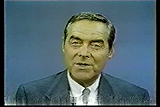 Jack Barry, stretching the definition of 'superb'. |
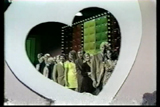 The six competing couples. |
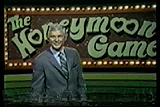 Host Jim McKrell and the logo. |
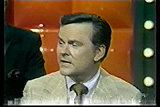 Bob Crane, wondering why Dawson isn't doing this. |
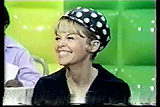 Jaye P. Morgan, wishing for a gong. |
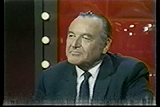 Edmund G. Brown, cursing the name of Ronald Reagan. |
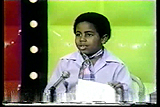 Marc Copage, getting ready to board the obscurity train. |
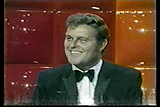 And your waiter, Don Drysdale. |
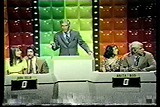 A set of round 2 players. |
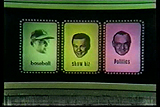 The result of a spin. |
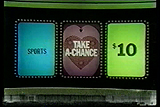 A round 3 spin. |
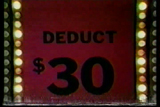 Yes, you're right, so you lose 30 dollars. |
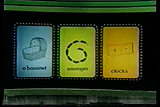 You could win a bassinet, sausage and a clock. |
This pilot has been viewed 11446 times since October 6, 2008 and was last modified on Dec 12, 2009 14:46 ET
Feedback? Contact me at usgs-pilot at the usgameshows dot net domain